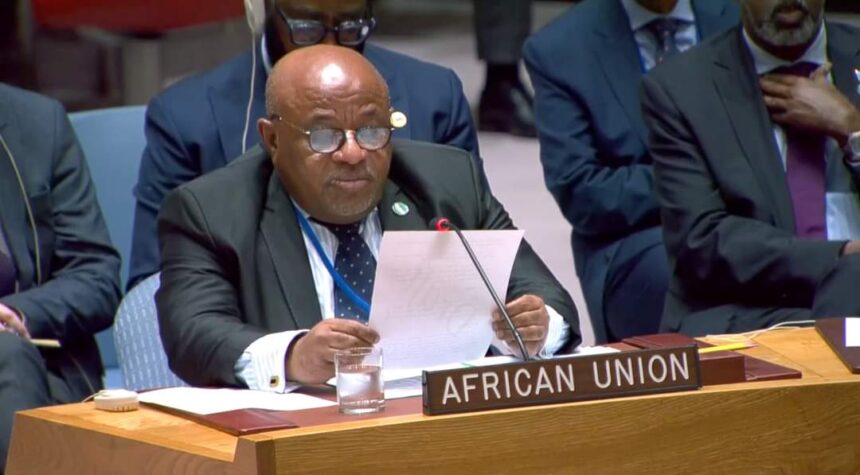In a highly anticipated address to the United Nations Security Council, Ambassador Souef Mohamed El-Amine, the Head of the African Transition Mission in Somalia (ATMIS) and Special Representative of the Chairperson of the African Union Commission (SRCC), shed light on the situation in Somalia and ATMIS’ significant role in advancing statebuilding priorities. Alongside President Hassan Sheikh Mohamud, Ambassador El-Amine highlighted the positive collaboration between ATMIS, the Federal Government of Somalia (FGS), and international partners in countering terrorism in the country.
Acknowledging President Mohamud’s exceptional leadership in steering Somalia towards lasting peace and security, Ambassador El-Amine commended the collective efforts aimed at combating Al-Shabaab, the main threat to Somalia and the region. Noting recent achievements, he highlighted the successful dislodgment of Al-Shabaab from over 70 locations in Somalia during the ongoing offensive led by the Somali Security Forces (SSF). This offensive, supported by ATMIS and international partners, has exerted significant operational pressure on the extremist group.
Emphasizing the progress made in the Federal Government’s force generation program, Ambassador El-Amine underscored ATMIS’ increased mentoring activities to the Somalia National Army (SNA) and the Somali Police Force. As part of the planned drawdown in line with UN resolutions 2628 (2022) and 2670 (2022), the handover of various Forward Operating Bases (FOBs) to Somali security forces is currently underway. Notable handovers include Marka Ayub FOB on June 18, Xaaji Caali on June 20, Mirtquo on June 22, Albao on June 25, Cadale on June 27, Aljazeera 1 on June 28, and Gherille on June 30.
Looking ahead, Ambassador El-Amine emphasized the need for collective agreement on the role ATMIS should continue to play during the drawdown and exit process in the next 18 months. Stressing the importance of a successful transition, he called for consensus among all stakeholders regarding Somalia’s goals and objectives for the given timeframe.
In addition to security concerns, Ambassador El-Amine highlighted the urgent need to address the adverse effects of climate change in Somalia. Expressing deep concern over the alarming rate of floods and droughts, he noted that these environmental challenges have resulted in the displacement of approximately 1.4 million Somalis, with women and children being the most vulnerable. He drew attention to the Secretary-General’s recent report, which underscored the severity of the situation and the pressing need for international assistance.
Turning to the issue of the arms embargo on Somalia, the SRCC stressed the importance of supporting Somali leadership in holding liberated areas and assuming control of FOBs. He emphasized that the Somali forces require sufficient resources to effectively combat Al-Shabaab and stabilize recently liberated regions. In light of this, he called for the lifting of the arms embargo on Somalia to enable the provision of necessary support.
Ambassador Souef Mohamed El-Amine’s address to the UN Security Council underscored the importance of continued collaboration and collective efforts to ensure Somalia’s progress in statebuilding, address climate change-related challenges, and support the country’s fight against terrorism. As the international community considers the next steps, it is expected that discussions will intensify to establish a comprehensive plan for Somalia’s successful transition in the coming months.





